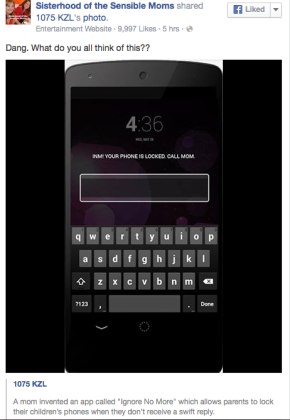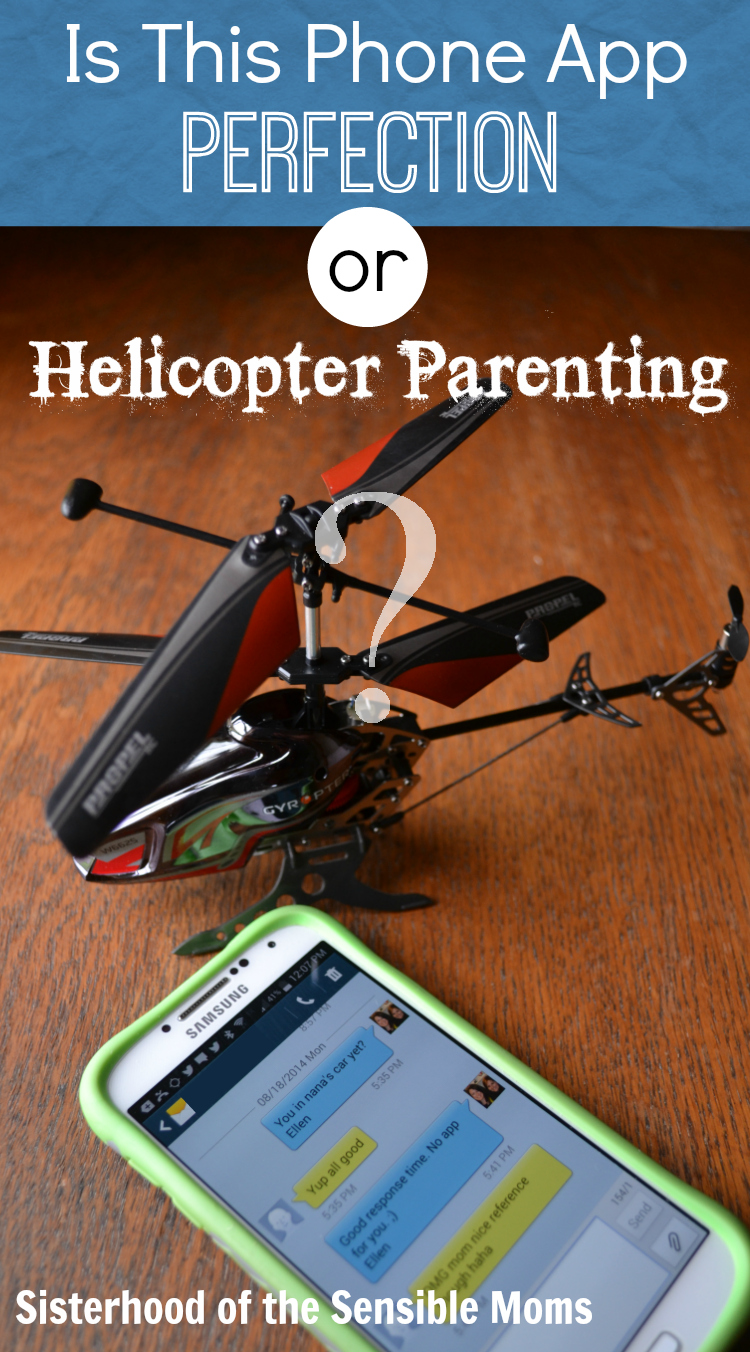Recently, we posted this on our Sisterhood Facebook page:
A mom created an app called “Ignore No More”. It is exactly what it sounds like. Your kid ignores your text? You lock down their phone until they respond. It generated a nice little conversation on our page with many “Heck yeahs” and “Perfects,” but we were unprepared for the reaction when we brought it up with our real live family.
Actually, we didn’t even bring it up with them directly. Our teen daughters overheard us talking about how the topic was pumping some life into our Facebook page.
They can’t hear us when we tell them to pick up their socks, but they heard us talking about this ten feet away as they were about to jump in the pool. In a word, the response was visceral.
Their heads snapped around and their outrage crackled the air at the mere mention of the words “phone” and “shutdown” in the same sentence.
It looked kinda like this:
This was all kinds of bizarro out of balance to us. At first glance, this app seemed well within the limits of parenting in a digital age. Because seriously, “Limits, boundaries, limits, boundaries,” is the modern media mom’s mantra, right?
After a double-take and a “Calm your giblets,” we threw this out there: “So what’s with the Mount Vesuvius of reactions? If you just answer your phones, this doesn’t affect you at all. No. Big. Deal.”
In all honesty, they were all so worked up in the beginning that they couldn’t really put a finger on exactly what the trigger was. Then after they calmed down a bit, their ideas started to take some shape:
“It would cut us off from everything.”
“It is such a violation.”
“But it’s just so wrong.”
But once again, “Kids, if you are copacetic with the mom-kid agreement to just answer our texts, it doesn’t really affect you. Like at all. Ever.”
That just stirred the outrage up to boiling again.
We took this moment to remind them about our overriding phone ground rule. “The phone belongs to us and you have it for our pleasure and convenience . . . like when we need you to take a video of us for a blog post. But seriously,we don’t mind you enjoying Instagram, but you only have the phone for safety purposes and so we can tell you who we found to pick you and your stinky cleats up from soccer.”
So we asked the question: “Why did you react SO viscerally? What is this really about?”
Again, there was a bit of an uproar, but as the emotional responses waned, their logical centers took over and they gave us this:
“It’s a violation of my privacy.”
“It feels like you’re being a control freak.”
“It’s all about trust.”
Oh.
Erin: And I started to see their point of view.The subtle messages we send to our kids are just as important as the overt lessons. With a second glance, we had to concede that they might be on to something.
Ellen: I have to admit when I posted about the app I thought, “This is a great idea,” and I wanted to see what our readers thought. Their responses were overwhelmingly favorable, just like mine.
Erin: But when I really thought about it, given our daughters’ reactions, this app really started to look like helicopter parenting in the extreme. The app’s point seemed to be, “I need you now. You will be available to me now. Oh, you’re not? Well, I can control that.” Yep. Looks a little like hovering in the extreme. Can you hear the thwack thwack of the rotors overhead?
Ellen: Now our kids were really calming down because they could see understanding dawning in our eyes. The more I thought about it, the more I realized I would never use this as anything other than a punishment. I set my expectations with my kids that their phone is for my convenience, but I also respect them enough to only text about the important things like, “You need to get in Mr. Brian’s car after band or you’ll have a long walk home.”
I’m not reminding them to turn in their papers or asking them to check in during their school day or bugging them to eat their sandwich before the cupcake. I am communicating, not helicoptering. Okay, sometimes I type out an “I love you,” or a “Good luck,” because a text is the teen version of a lunchbox note, but that is still not hovering and no response is required.
Erin: Our girls sprawled on the pool lounges with relief when we concluded this app would only be a tool for us to discipline a child without taking away the safety of having a phone.
Ellen: We all agreed, there would be many discussions and a hefty grounding going on before this app was installed.
So NOW what do YOU think?
Is this app a good idea or helicopter parenting at its worst?
What phone rules do you have for your children?
We would love to hear from you,
Erin and Ellen
You can follow us on Google+, Twitter, Facebook, Instagram, and Pinterest.
Check out our books, “I Just Want to Be Alone” and “You Have Lipstick on Your Teeth.”
Have every post delivered to your inbox! You can opt out at any time, but you won’t want to.













